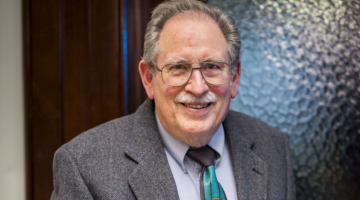
(Image via Getty)
Being a first-generation college student in law school feels like standing on the periphery of a crowd, nearest the edge of a cliff. To everyone else in the crowd, it looks like you stand amongst them. Only you notice that your feet linger precariously closer to the ledge. Your margin for error feels narrow: one wrong academic or financial step and you fall into the crevasse below.
Articles abound discussing the challenges of first-generation college students. Fewer articles exist about the challenges of first-generation students in law school. But those few articles have common themes. First-generation law students tend to take out more loan money than other students. We often lack the financial resources of our peers. We struggle to find commonalities during mixers and interviews. Yet there is something more intimately tied with being a first-generation law student that comes out when a group of us sit down to talk about the experience: the feeling of standing precariously close to a ledge.

A Career In Legal Services: Practising Law Institute Honors Toby J. Rothschild
PLI honors Toby J. Rothschild with its inaugural Victor J. Rubino Award for Excellence in Pro Bono Training, recognizing his dedication and impact.
First generation college students often lack a financial safety net. Almost every law student is hyper-aware of finances. But for many first-generation students, parents cannot help them. Without taking on more debt, a broken computer, phone, or car can become an insurmountable obstacle. All students need these for exams, hearing from potential employers, and getting to interviews. Well-meaning mentors, advisers, even bloggers, and podcast hosts advise to just take out additional loans. Taking out extra loans should be carefully considered. Subsidized loans accrue interest at a 6.8 APR interest rate. This means that deciding law school isn’t for you, or failing, is more expensive for first-generation students than for others.
First-generation students may also lack an emotional or social safety net. We are not just the first in our families to go to law school or college, we are often among the first in our communities to go. No one expected me to go to college — let alone law school. Going straight to work after high school was the norm where I grew up in rural Arkansas. Few people had degrees. If anything, college removed you from the community — both physically and sometimes socially. For some parents, having their children go to law school will fill them with pride. For others, it will seem indulgent. There may even be a tinge of guilt for the many students expected to contribute financially to their families. The degrees of support for law school will vary with first-generation students depending on their community’s perception of lawyers.
For many of us, lawyers and the police symbolized an intrusion. Our communities were the ones being policed. For many of my fellow first-generation law students, there’s a legacy of fear mixed with an intense desire to change the dynamic. This may even have motivated some students to go to law school. At the same time, first-generation students can feel more like infiltrators than part of a profession. Impostor syndrome is endemic within law school, but it can be especially intense for first-generation students. Yet the experiences that created that perspective can create empathetic, insightful lawyers. That perspective is invaluable. First-gens: You belong in law school — the legal profession needs you.
A lack of institutional knowledge about the professional world, law school, and the legal community can make the ledge loom even more precariously. In his gruffest tone, my father often grumbled, “Who you know matters more than what you can do.” First-generation law students often lack a professional network. Networking may even be considered an intensely dishonest practice. My parents and most of my community spent long days working in factories around multi-ton machines; it was difficult and dangerous work. Their friendships arose from hardships. Seeking mentors, advisers, and friends at a networking event is the opposite of how we learned to form friendships.

The Next Step In Legal Document Automation
LexisNexis’ ‘multi-doc’ feature for Automated Templates will add new efficiencies to your practice. Here’s how.
Visiting a professor can seem daunting. In a world where first-generation students may not think that we entirely belong, it is helpful to get more than the “just go visit” or “come ask a question” from your instructor. For me, at least, I had a list of questions that could fill more than a few fleeting moments, even if I understood the material. But visiting your professors is important. You will want to get to know them because they’re interesting people (and you need recommendations).
The most common piece of advice a first-generation student hears is that “anything is achievable, but you just have to hustle/work harder.” This oft-repeated sage advice first recognizes a heavier burden, but then immediately dismisses it as a question of grit and perseverance. Yet everyone, or mostly everyone, in law school is working as hard as possible. First-generation law students do not have an extra reservoir of grit and perseverance. Look for the people who recognize that unique burden without dismissing it. These people may be graduated first-generation college students themselves. They may be mentors who understand the feeling of precariousness.
Do you remember walking into to that first college class? Do you remember taking your seat and embracing the title “college student” like a sacred identity only given to the few? I do. Then, I looked around the class and realized no one else seemed to be feeling this overwhelming sense of achievement just for occupying a seat in the room. Despite being on the ledge, you know that just being there, or having a seat at all, is a chance to do great things with your career and for your community. This is only the beginning. As more first-generation college students go to law school, we can help others like us with this feeling of precariousness. Reach out. Help build bridges that will support future first-generation college students in your law schools. Your presence and perspective are invaluable.
K.G. Molina (@CanPanicNow) is a law student, an Editorial Board member of the ABA Law Student Division, and talks about law school a lot. Please follow on Twitter (@CanPanicNow) for amusing and insightful commentary. Email questions or comments to [email protected].
LawProfBlawg is an anonymous professor at a top 100 lawschool. You can see more of his musings here. He is way funnier on social media, he claims. Please follow him on Twitter (@lawprofblawg) or Facebook. Email him at [email protected]. The majority of this insightful blog post is K.G. Molina’s, which should spontaneously cause you to offer her gainful employment. Anything you hate is my idea. But I’m still right.